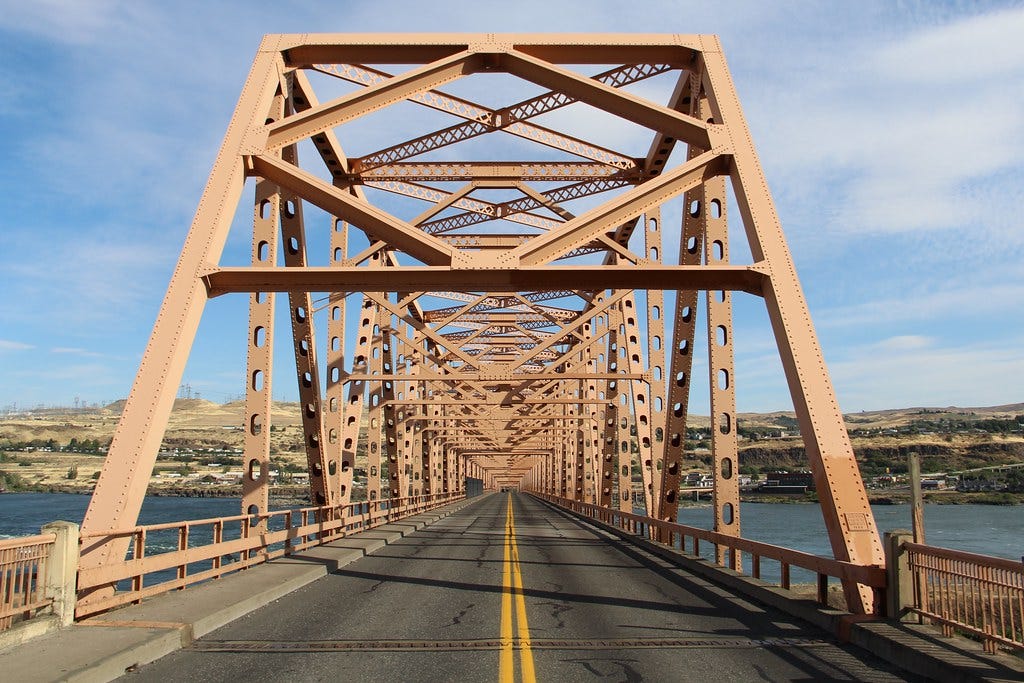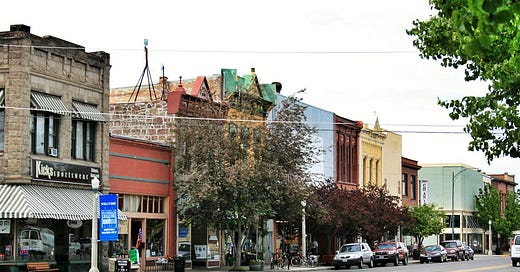A letter to our next governor, and you.
Rural Oregonians are conflicted. We need more support, but we don’t want to sacrifice our way of life. We want stable jobs, but we also want a stable community.
EDITOR’S NOTE:
Are you looking to join our pen pal project? Ginger Savage, in her post below, welcomes you to start a dialogue with the Oregon Way on this blog. Learn more below and email me if you are interested: kfraz@berkeley.edu.
The hope is for an ongoing chain of “letters” reflecting on the last letter and raising questions for future letter-writers.

Dear Kevin,
It was so good to hear from you! Pen Pals are needed in these exhausting days of Zooming, mask-wearing, and vaccine-seeking.
I love your ideas about the Oregon Way and agree that average Oregonians need to shape the political dialogue of our state. With that goal in mind, you asked me to start this pen pal project by writing a letter to future gubernatorial candidates for the State of Oregon and share my thoughts as a lifelong rural Oregonian.
I would love to hear what ideas our friends in the Willamette Valley or Portland area have for our future governor. Maybe, just maybe, if we put our heads together now we can find the Oregon Way and make our next governor follows it.
Dear Candidates,
Hi! I am Ginger Savage, a lifelong Oregonian, born and raised in Central Oregon. For the last 31 years, I have lived in Baker City in rural Eastern Oregon. In this great, small town, I have raised a family, worked hard, and dreamt of a better Oregon. I thought I would share some ideas and details about my views of rural Oregon. Though it may sound too obvious to mention, it’s too important not to: the next governor must prioritize connecting with Oregonians from every corner of the state.
You have to visit!
If you want to be governor for ALL of Oregon, come visit us in Rural Oregon and I mean all of it. Bandon to Baker City, Astoria to the Alvord Desert—get ready for a road trip.
You will have these political “minions,” your consultants and such, who say don’t go out there—there are too few votes, it takes too long, costs too much, and who really cares about those people. But those minions don’t come with you to the Capitol.
The second you become governor, re-election should not be your focus; governing must be your priority and those minions have little to say on that front. If you listen to the pollsters and pundits, then you’ll stay in Salem, travel to Portland to raise money, and come East of the Cascades for a vacation or two.
If you aim to listen to average Oregonians instead, then you’ll prioritize coming over here for more than a hike. Only through intentional and long-term stints on this side of the mountains will you be able to govern with all Oregonians in mind, especially those in rural Oregon who have been wholesale ignored by many formergGovernors and members of the political elite.
Come East because you want to understand this remarkably diverse state, warts and all. Come and see how far it is between bathrooms, come experience the lack of cell reception, come see the beauty and the poverty first hand. Come listen to ordinary Oregonians talk about their lives and how they make a living. Come and understand the difference between rural and frontier and how it impacts the lives of ordinary Oregonians
Tip #1: Check your suits and/or suits and heels at the door. But do not wear a cowboy hat or western shirts because you will look silly.

Not all rural Oregon is the same!
Know it! Live It! And, please DON’T FORGET IT!
Define rural by what we define rural as—not what that minion analyst tells you. “Rural” may be found in a dictionary, but it has to be experienced to be understood and it is experienced differently in various parts of the state.
Know the difference between what “rural” means in Eastern Oregon, Central Oregon, Southern Oregon, and the North Coast, Mid Coast, and South Coast. Inside those regions are sub-regions and when you see the difference in “rural” by region firsthand you will make you a better leader.
Understand that rural towns, as a whole, dislike being compared to other rural towns. The iconic and ignorant “Is that near Bend?” causes shutters of misery; we know where Portland is in relation to Gresham, take the time to learn the nooks and crannies of the state you’re at the helm of.
Tip #2: When you are in rural Oregon and you are talking to real Oregonians take a quick peek at their shoes. It tells you so much about them. If they are in work boots it means they dropped everything to give you their time. Respect that time. And, know that the work boot of my Eastern Oregon ranching friends is completely different from a fisherman on the coast.
Of course, there are similarities between us non-Portland Oregonians. Those who make their living from the land or sea…they work so very hard. They also live in places deeply impacted by the climate and their hands produce the bounty that feeds us all.
But all rural Oregonians are all not Ranchers or Fishermen. You will find the widest variety of people who live very different lives from craftsmen and timberman; for example, office workers and tech company leaders. Their ingenuity coupled with a significant generational shift is transforming rural Oregon and we need a governor who understands the unique geography of Oregon and how it drastically impacts everything from water, electricity, transportation, housing, and community.
Understand the systemic shifts in Oregon and be able to explain them
In the Oregon I grew up in, business growth could only happen in the Portland Metro Area. For far too long, our Economic Development strategy has been based on the outdated premise that the only place business wants to go is Portland. There’s an assumption that Portland has an exclusive hold on the infrastructure, the access to shopping, nightlife, and the arts that any good company would want.
Under this strategy, some of the most verdant, highly productive agriculture ground in the state was tilled and replaced with manufacturing plants and subdivisions.
Times and technology have changed. The Portland Only Model stopped being true a few decades ago.
On the one hand, my children and Millennials and Gen Zers will go where the jobs go and stay where the quality of life is high. Those youngsters bring a lot of vitality to their communities.
On the other hand, seniors are being priced out of these cities and moving to small towns for a slower pace. Those who choose to leave usually bring the resources to live comfortable lives wherever they end up. But those priced out of growth areas with no resources spend months looking for cheaper rent, struggling with the lack of services, and grappling with the distances they have to travel to receive health care from a specialist.
We meet more and more people in rural Oregon who have been displaced by economic hardship induced by a “growth-first” mentality. Oftentimes they come with no family, friends, or support system.
Rural Oregonians are conflicted. We need more support, but we don’t want to sacrifice our way of life. We want stable jobs, but we also want a stable community. I cannot tell you how to resolve these tensions, but I invite you to come learn about them and to help us find a way forward.

Where is the common ground?
Oregonians, urban and rural, have a few things in common and that is where your administration should start its policies. Focus on the basics: connect all of Oregon to high speed broadband, cell service, and power (all that can be made to blend into the beauty of our state!). Update our infrastructure: I think a lot of Oregonians would like to see rail transportation back as we work to address climate change. Prepare people for 21st Century jobs! Oregonians want a trained high quality diverse workforce. Reform our government: You have to address the wreckage at the Employment Division, DMV, DHS, and the list goes on. Our agencies and structures were designed for a bygone era—the result is a waste of money and a lack of accountability.
In short, be transformative! Buck the idea of “Portland-down” governing—what’s good for Portland might not be good for the rest of the state. Leave the minions at the campaign office and embrace the fact that, come 2023, we should be free of COVID-19 and you should be free to spend a tremendous amount of time East of the Cascades. Free of COVID steering your agenda, you will have a bit of a clean slate to address the systematic failures in government that COVID-19 laid bare.
So, there you go, Kevin…my first pen pal letter for Oregon. Thank you for asking me to start this worthy project and I look forward to reading all the different perspectives; I know I will learn a lot. I am eager to learn what other Oregonians want to make sure the next Governor prioritizes.
Thanks!
Ginger
*******************************************
Ginger L Savage, Executive Director of Crossroads Carnegie Art Center in Baker City, OR. Lifelong Central and Eastern Oregonian.



